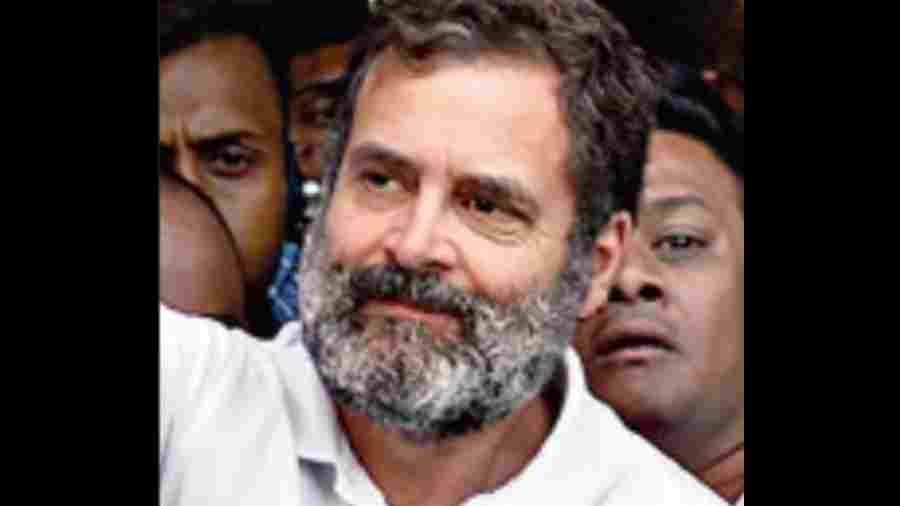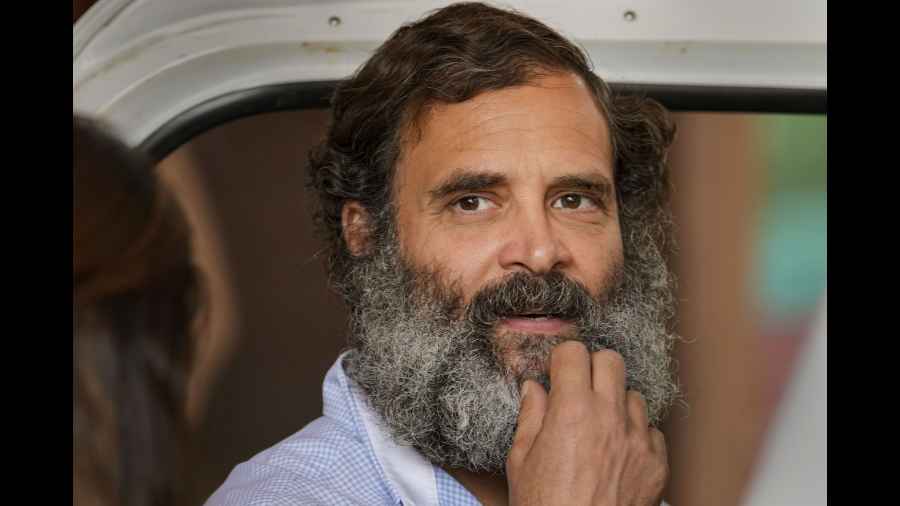The Surat sessions court on Thursday declined to stay Rahul Gandhi’s conviction for defamation, which has cost him his membership of Parliament, prompting the Congress to suggest that false comparisons were drawn with corruption and manslaughter cases to deliver an “erroneous” judgment.
One of the points underscored by Congress spokesperson and senior lawyer Abhishek Singhvi, who heads Rahul’s legal team, was:
■ The judge based his conclusions on the alleged defamation of the Prime Minister without realising that Narendra Modi was not even the complainant.
The PTI news agency quoted additional sessions judge R.P. Mogera as saying the utterance of defamatory words and comparing persons with the “Modi” surname with thieves “would definitely have caused mental agony and harm the reputation of complainant Purnesh Modi, who is socially active and dealing in public”. Purnesh is the BJP MLA from Surat West.
The other points flagged by Singhvi are:
■ The judge compared the case against Rahul to others that were far more serious.
■ The judge presumed incorrectly that Rahul had failed to establish that a failure to stay the conviction can cause him irreparable and irrevocable damage.
Rahul will now appeal before the high court.
“A most unfortunate and unsustainable legal decision of the magistrate has been upheld in an even more erroneous judgment of the sessions court,” Singhvi said.
Rahul’s lawyers believe that his comment — “Nirav Modi, Lalit Modi, Narendra Modi… how all thieves bear the same surname ‘Modi’” — has been misinterpreted.
Judge Mogera said Rahul should have, as an MP, been more careful with his words.
Defending the award of the maximum possible sentence of two years, the judge said that any defamatory word from an MP can have a big impact on people’s minds and cause mental agony to the aggrieved person.
He added that removal or disqualification as an MP cannot be construed as irreversible or irreparable damage.
Conviction and a sentence of two years or longer disqualifies a person as a lawmaker and debars them from contesting elections for six years after the end of the sentence.
Singhvi said the judge had cited several Supreme Court judgments but, ironically, all of them strengthened Rahul’s case and were wrongly interpreted by the court.
“I’ll give you a few examples. In one Sareen case, the court says (explains) why suspension of conviction should happen in the rarest case and not in a corruption charge against a public servant. Was the case against Rahul about corruption?” he said.
“The next case cited is of Navjot Singh Sidhu. What did Sidhu do? Sidhu was convicted of manslaughter. But he was given a suspension of conviction because he argued that he would be disqualified as MP.
“What is Rahul citing? The same, that he will be disqualified as MP. Why this difference in approach? What else can the appellant say (plead) except irreversible and irreparable damage (caused by) disqualification from Parliament?”
Singhvi added: “In the other case cited, of Shyam Narain Pandey, the offences involve moral turpitude. The Supreme Court had said, ‘If the convict is involved in crimes which are so outrageous that it will shock the conscience of the nation and cause serious impact on public perception if the conviction is stayed, etc’…. Does this fall in that category?
“The judge could not establish that these observations of the Supreme Court could be applied to a vague defamation case.”
Singhvi said the second part of the sessions court judgment repeatedly maintained that Rahul’s was an outrageous instance of defamation because Prime Minister Narendra Modi had been defamed along with the 13 crore other members of the Modi community.
“A... wrong interpretation. The first part is clearly actuated by excessive reliance on the alleged defamation of a sitting Prime Minister. The judge forgot that the Prime Minister is not the complainant,” Singhvi said.
“In defamation law, the aggrieved party must be the complainant. The Prime Minister never filed a petition.”
He went on: “A complete lack of application of mind is reflected again in the fallacies of this observation that the appellant has failed to demonstrate that by not staying the conviction and denying (him) an opportunity to contest the election on account of disqualification, irreversible and irrevocable damage is likely to be caused to the appellant. But what else can Rahul Gandhi show?”
Singhvi declared that Rahul would continue to ask questions about Adani and about Modi’s various failures despite the efforts to silence him.
Just before Thursday’s verdict, Rahul had posted a video referring to how Adani’s business empire had expanded across India on Modi’s watch.
“Expansion of business is good but this was magic. Airport seth ke, port seth ke, bijli seth ki, khadane seth ki, zameen seth ki, aasman seth ka. Seth kiska? Seth saheb ka. How are all the national assets being transferred to one man? Who is behind this man?” he wrote.











